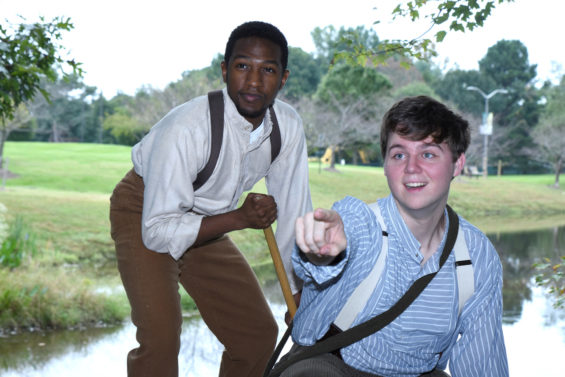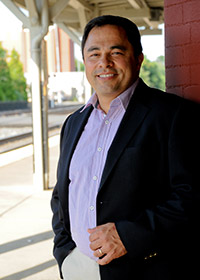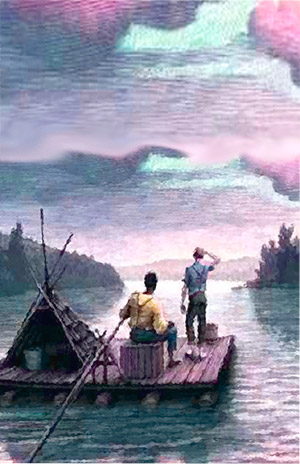This week, George Mason University’s School of Theater and School of Music will collaborate to present a musical adaptation of a Mark Twain classic—the 1985 Tony Award winning hit, Big River: The Adventures of Huckleberry Finn.

Garvey Dobbins (Jim) and Jeffrey Samuel Trent, Jr. (Huck). Credit R Kelberg.
Thanks to a Tony-winning book by William Hauptman and Tony-winning score by Roger Miller, the show played Broadway for more than 1,000 performances and had a critically-acclaimed revival in 2003.
All of the elements of Twain’s legendary 1884 novel are in the musical. Set along the Mississippi River, the plot follows Huckleberry Finn, a wild child who helps his friend Jim, a runaway slave, escape to freedom. Through a series of hilarious encounters and elaborate hoaxes, Huck and Jim share heartwarming adventures in their search for liberty.
Mason’s production of Big River is directed by noted DC director and thespian, Thomas W. Jones II. Ken Elston, director of the School of Theater, also had a hand in bringing the production to the stage. I recently caught up with both theater lovers to talk about what people can expect from this show.
Loria: What is your background with this musical? Did you see it on Broadway, were you a fan of the soundtrack?
Elston: The soundtrack is amazing. Roger Miller won the Tony. He wrote honky-tonk and novelty songs, but he captured real ear worms for this play. His only prior foray into the musical format was writing a handful of “down home” ditties for the Disney animated film, Robin Hood. His score for Big River is richly textured and tunefully infectious.

Ken Elston
Loria: Why do you feel this is a good production for the theater?
Jones: Big River is an American musical tonal poem rooted in the American experience; a theatrical homage to the rich literary wit of one of America’s great writers, Mark Twain. It journeys through race and bigotry, and courage and loyalty, much like the raft that travels the great Mississippi River.
Elston: The American musical is a native art form, and Big River is a celebration of American music. It is a unique piece. The choice of title was not without certain challenges. Though the play is much less ambivalent in its depiction of slavery than Twain’s novel—and its portrayal of Jim as a sympathetic character more palatable, delivering a strong message of equality—it remains a reminder of our collective mistakes, and it asks young actors to take on difficult roles.
In addition, though Hauptman more fully develops some minor characters from the novel, the world represented in Adventures of Huckleberry Finn is largely male. Our guest director, Thomas W. Jones II, has taken these aspects of the play firmly in hand. He has been working with the Mason Players ensemble to create a stellar and socially conscious production. The creative team, especially Musical Director Joe Walsh and Choreographer Stefan Sittig, is bringing the best out of the play and the performances. Of course, this School of Theater production will be framed by beautiful and thoughtful designs, and audiences will love this treatment of this multi-Tony-Award-winning musical.
Loria: What interested you about doing this show now?
Elston: William Hauptman’s edits and adaptation of Mark Twain’s The Adventures of Huckleberry Finn are masterful, and the story really zips along. It is a character-driven plot, the piece takes us on the emotional journey of Huck and Jim as they sail the river with hope in their hearts—a journey that brings these two unlikely friends together. Huckleberry Finn, a boy on the run from his abusive father and from the townsfolk who want to civilize him, makes the decision to help Jim escape slavery. The arc of the adventure allows them a unique chance to live and learn from each other while literally traveling down a river-road of life. The conflict between civilization and “natural life” is epitomized by the desire to escape an oppressive society and reconcile a life built on empathy, through an emotional maturation.
Loria: Tell me a bit about your cast—what went into choosing the right Huck and Jim?
Elston: Jeffrey Trent and Garvey Dobbins have a natural chemistry and they are immensely talented. They manage comedy and humanity…character and élan. All of our theater majors are great.
Jones: The company at Mason’s School of Theater is a multi-talented ensemble that delivers comic and dramatic tones with great elasticity. They create a magical tapestry that both leans on the Tony award-winning play while expanding its themes for a contemporary audience.

Thomas W. Jones II
Loria: Why is this a story that people still gravitate to today?
Elston: I would argue that the play delivers a message of equality; provides us with reminders of past mistakes in our society; it portrays hypocrisy [especially of religion]; and details a journey of maturation. In Big River, the Mississippi River and the raft that Huck and Jim share along the way, is what ultimately brings these two unlikely friends together; it allows them a unique chance to live and learn from each other while literally traveling down a river-road of life. The play actually takes us on the emotional journey of Huck and Jim as they sail the river with hope in their hearts.
Jones: Its significance today resonates as strongly as when first conceived by Twain and adapted by Hauptman and Millet in the ’70s. The arc of the American moral compass is long and tilts toward justice. The uncompromising friendship of Huck and Jim in Big River is a reminder that what binds our humanity is greater than what divides it.
The show dates are as follows:
Thursday, October 25–Saturday, October 27 at 8 p.m.
Saturday, October 27 at 2 p.m.
Sunday, October 28 at 4 p.m.
Tickets to Big River: The Adventures of Huckleberry Finn are $30 for adults and $15 for students and seniors. These are available in person at the Center for the Arts’ Ticket Office (open Tuesday-Saturday 10 a.m.-6 p.m.), by phone at 703-993-2787, or online at cfa.gmu.edu.






